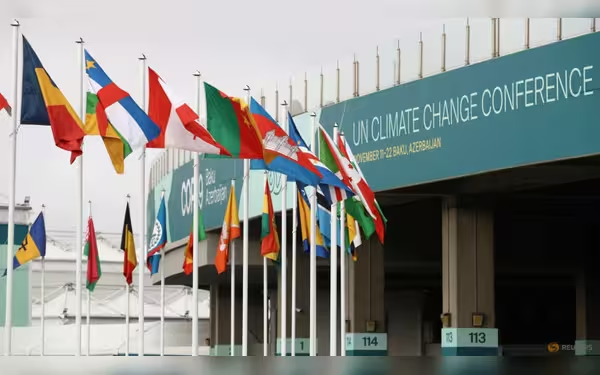Saturday, November 23, 2024 04:22 PM
COP29 Negotiations: Financial Support for Developing Nations at Stake
- Urgent financial support needed for developing nations
- Developing countries demand US$1.3 trillion by 2030
- COP29 deadline approaches with unresolved financial targets
 Image Credits: channelnewsasia
Image Credits: channelnewsasiaCOP29 negotiations in Baku focus on urgent financial support for developing nations as deadline approaches.
As the world grapples with the pressing issue of climate change, the ongoing UN climate talks in Baku, Azerbaijan, have become a focal point for negotiations aimed at securing financial support for poorer nations. The urgency of these discussions is underscored by the looming deadline of COP29, which is set to conclude on Friday, November 22, 2023. However, with rich and developing countries rejecting a draft deal, it is clear that the path to a comprehensive agreement is fraught with challenges.
The primary objective of COP29 is to establish a new financial target to replace the existing commitment of US$100 billion per year from wealthy nations to assist developing countries in reducing emissions and adapting to climate-related disasters. Developing nations, along with China, are advocating for a more ambitious target of US$1.3 trillion by 2030, with at least US$500 billion of that amount expected from developed countries. This demand has met resistance from major contributors like the European Union, which argues that private sector investments should also be included in the overall financial goal.
In the latest draft presented by the Azerbaijani hosts, it was acknowledged that developing countries require at least "USD [X] trillion" annually, yet a specific figure was conspicuously absent. Cedric Schuster, the chairman of the Alliance of Small Island States, emphasized the importance of this missing number, stating, "There is a critical piece of this puzzle missing: the overall number." Similarly, Ali Mohamed, the chair of the African Group of Negotiators, referred to the absence of a concrete figure as the "elephant in the room," highlighting the centrality of this issue to the negotiations.
As the clock ticks down, COP29 hosts have indicated that a revised draft is expected to be released, which will "contain numbers" crucial for moving forward. UN Secretary-General Antonio Guterres has called for a significant push to finalize discussions, urging all parties to collaborate and find common ground. China, the world's largest emitter of greenhouse gases, has expressed dissatisfaction with the current text but has encouraged all nations to meet each other halfway.
The stakes are high, and the outcome of these negotiations will have far-reaching implications for global efforts to combat climate change. As nations continue to debate and negotiate, it is essential to remember that the fight against climate change is not just about numbers; it is about the future of our planet and the well-being of generations to come. The world is watching, and the time for decisive action is now.













